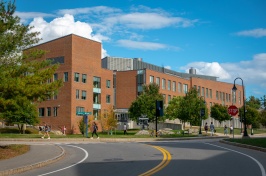UNH Research Finds Rural Population More at Risk From COVID-19

DURHAM, N.H.—America’s rural population is at higher risk from COVID-19 because its people are older and have a higher rate of pre-existing health conditions, according to new research released by the Carsey School of Public Policy at the University of New Hampshire. Rural areas may currently have lower COVID-19 case and death rates, but these rates are rising faster than in urban areas.
“As the virus spreads, the risk to rural populations is growing,” said Kenneth Johnson, professor of sociology and senior demographer. “Should the spread of the virus further disrupt the infrastructure and supply chains of rural America, it will have significant implications for the nation at large because rural America provides most of the country’s food and raw materials.” Johnson noted that because distances are greater, places are more isolated and population density is lower, rural populations have been sheltered from the initial onslaught of COVID-19. That situation is rapidly changing, however, and response to the virus must address the needs of both urban and rural areas.
The Carsey School of Public Policy is nationally recognized for research, policy education and bringing people together for thoughtful dialogue to address important societal challenges. The school develops and facilitates innovative, responsive and equitable solutions at all levels of government and in the for-profit and nonprofit sectors.
This research was supported by the author’s Andrew Carnegie fellowship and the New Hampshire Agricultural Experiment Station in support of Hatch Multi-State Regional Project W-4001 through joint funding of the National Institute of Food and Agriculture, U.S. Department of Agriculture.
The University of New Hampshire inspires innovation and transforms lives in our state, nation and world. More than 16,000 students from all 50 states and 71 countries engage with an award-winning faculty in top-ranked programs in business, engineering, law, health and human services, liberal arts and the sciences across more than 200 programs of study. As one of the nation’s highest-performing research universities, UNH partners with NASA, NOAA, NSF and NIH, and receives more than $110 million in competitive external funding every year to further explore and define the frontiers of land, sea and space.
Latest News
-
October 24, 2025
-
October 8, 2025
-
October 2, 2025
-
September 24, 2025
-
September 15, 2025















































